How to remove Image Search adware and the advertisements it delivers?
AdwareAlso Known As: Ads by Image Search
Get free scan and check if your device is infected.
Remove it nowTo use full-featured product, you have to purchase a license for Combo Cleaner. Seven days free trial available. Combo Cleaner is owned and operated by RCS LT, the parent company of PCRisk.com.
What is Image Search?
Image Search is a piece of rogue software, endorsed as a tool for easy access to image databases. To elaborate, this product allows users to search for images on Unsplash, Creative Commons, Pinterest, Pexels, and PixaBay - by highlighting text on any website and opening the right-click menu.
However, Image Search also delivers misleading/malicious ads and collects browsing-related information. Due to this behavior, this tool is classified as adware. Since most users install Image Search inadvertently, it is categorized as a PUA (Potentially Unwanted Application) as well.
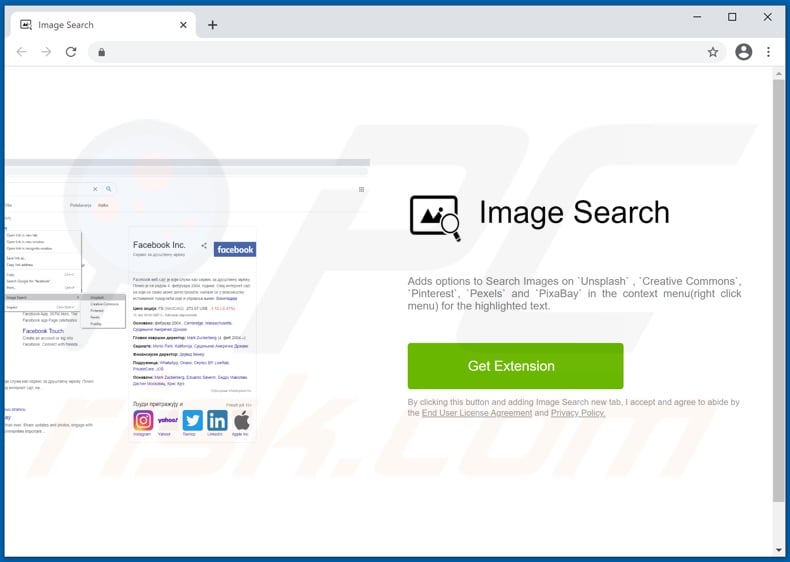
Adware enables the placement of third-party graphical content - typically, on any visited site. It delivers various pop-ups, banners, coupons, surveys, full-page, and other intrusive advertisements. They seriously diminish the browsing experience by slowing down the browsing speed and overlaying webpages.
Additionally, these adverts pose a threat to device/user safety. Once clicked on, intrusive ads redirect to questionable/dangerous websites and some can stealthily download/install software (e.g., PUAs). PUAs are commonly proliferated via intrusive advertisements.
These apps can have heinous functionalities, and these functions can be in different combinations. Unwanted applications can force-open untrustworthy/malicious pages, run intrusive advert campaigns, and/or hijack browsers.
The latter are called browser hijackers; they operate by making modifications to browser settings and restricting/denying access to them - in order to promote fake search engines. The promoted web searchers seldom can provide search results, so they redirect to Google, Yahoo, Bing, and other legitimate search engines.
Furthermore, most PUAs (regardless of other abilities) can track data; Image Search also has such a functionality. Information of interest includes: URLs visited, webpages viewed, search queries typed, IP (Internet Protocol) addresses, geolocations, and even personally identifiable details.
What is more, the collected data is then monetized by being shared with and/or sold to third parties (potentially, cyber criminals). In summary, unwanted software can cause system infections, severe privacy issues, financial losses, and result in identity theft.
To ensure device integrity and user privacy, all suspicious applications and browser extensions/plug-ins must be eliminated immediately upon detection.
| Name | Ads by Image Search |
| Threat Type | Adware, Unwanted ads, Pop-up Virus |
| Browser Extension(s) | Image Search |
| Supposed Functionality | Easy access to image databases. |
| Symptoms | Seeing advertisements not originating from the sites you are browsing. Intrusive pop-up ads. Decreased Internet browsing speed. |
| Distribution Methods | Deceptive pop-up ads, free software installers (bundling), fake Flash Player installers. |
| Damage | Decreased computer performance, browser tracking - privacy issues, possible additional malware infections. |
| Malware Removal (Windows) |
To eliminate possible malware infections, scan your computer with legitimate antivirus software. Our security researchers recommend using Combo Cleaner. Download Combo CleanerTo use full-featured product, you have to purchase a license for Combo Cleaner. 7 days free trial available. Combo Cleaner is owned and operated by RCS LT, the parent company of PCRisk.com. |
SystemMonitor, OneUpdater, Chrome Tools, and History Wipe Clean are a few examples of software within the adware classification. It usually appears legitimate and offers "handy" features. However, the functionalities rarely work as promised, and in most cases - they do not work at all. In fact, this is true of nearly all PUAs.
The only aim of unwanted apps is to generate profit for the developers. Therefore, instead of delivering on any promises, PUAs can deliver intrusive ad campaigns, cause redirects, hijack browsers, and collect private information.
How did Image Search install on my computer?
Select PUAs (e.g., Image Search) have "official" promotional sites, from which they can be downloaded. These applications can also be downloaded/installed together with other products. This false marketing method of packing regular software with unwanted or malicious additions - is termed "bundling".
Rushed download/installation processes (e.g., ignored terms, used pre-set options, etc.) increase the risk of unintentionally allowing bundled content into the system. Intrusive advertisements proliferate PUAs as well. Upon being clicked, the ads can execute scripts to download/install software without user permission.
How to avoid installation of potentially unwanted applications?
It is important to research products prior to download/installation and/or purchase. Additionally, all downloads must be done from official and verified sources. Since dubious download channels, e.g., unofficial and free file-hosting websites, Peer-to-Peer sharing networks, and other third-party downloaders - often offer harmful and/or bundled content.
When downloading/installing, it is advised to read terms, study available options, use the "Custom/Advanced" settings and opt-out from additional apps, tools, features, etc. Intrusive adverts appear ordinary; however, they redirect to highly unreliable and questionable webpages (e.g., gambling, pornography, adult-dating, and so on).
In case of encounters with such ads and/or redirects, the system must be inspected and all suspect applications and browser extensions/plug-ins detected - immediately removed from it. If your computer is already infected with Image Search, we recommend running a scan with Combo Cleaner Antivirus for Windows to automatically eliminate this adware.
Screenshot of Image Search adware asking to be permitted to track data:
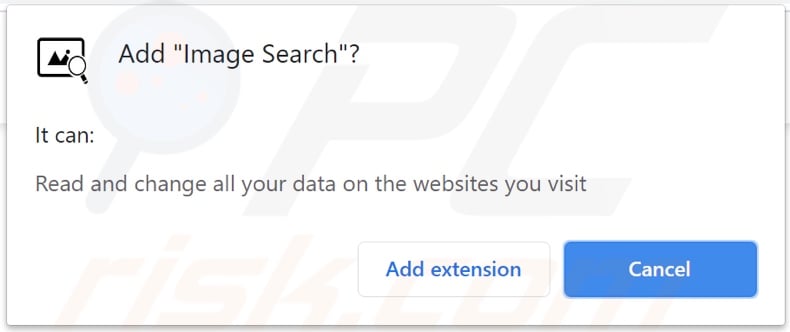
Screenshot of Image Search adware's promised feature (easy access to image databases) in use:
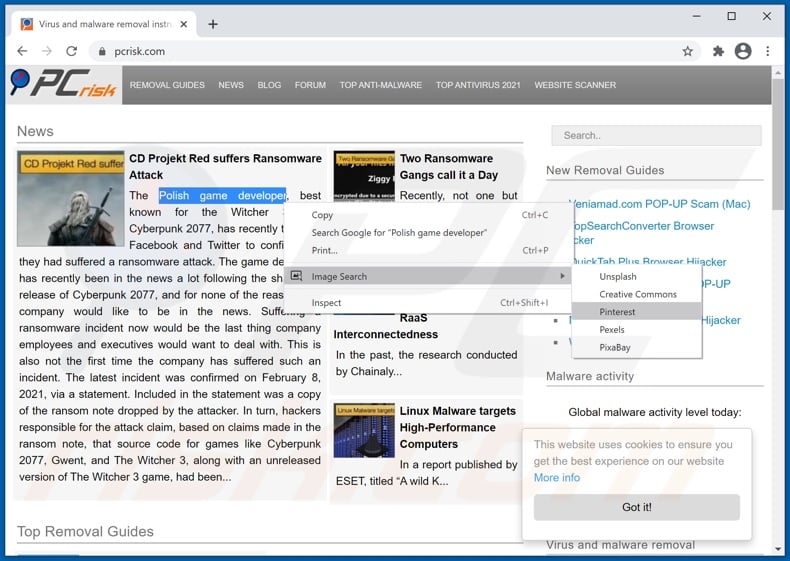
Instant automatic malware removal:
Manual threat removal might be a lengthy and complicated process that requires advanced IT skills. Combo Cleaner is a professional automatic malware removal tool that is recommended to get rid of malware. Download it by clicking the button below:
DOWNLOAD Combo CleanerBy downloading any software listed on this website you agree to our Privacy Policy and Terms of Use. To use full-featured product, you have to purchase a license for Combo Cleaner. 7 days free trial available. Combo Cleaner is owned and operated by RCS LT, the parent company of PCRisk.com.
Quick menu:
- What is Image Search?
- STEP 1. Uninstall Image Search application using Control Panel.
- STEP 2. Remove Image Search ads from Google Chrome.
- STEP 3. Remove 'Ads by Image Search' from Mozilla Firefox.
- STEP 4. Remove Image Search extension from Safari.
- STEP 5. Remove rogue plug-ins from Microsoft Edge.
- STEP 6. Remove Image Search adware from Internet Explorer.
Image Search adware removal:
Windows 11 users:
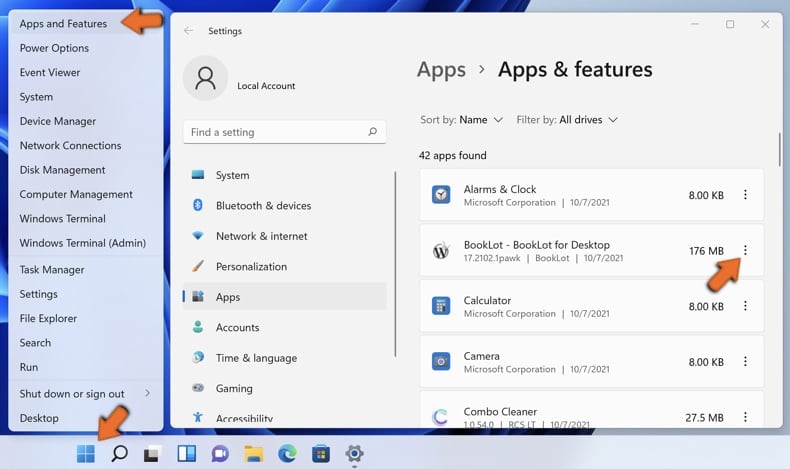
Right-click on the Start icon, select Apps and Features. In the opened window search for the application you want to uninstall, after locating it, click on the three vertical dots and select Uninstall.
Windows 10 users:
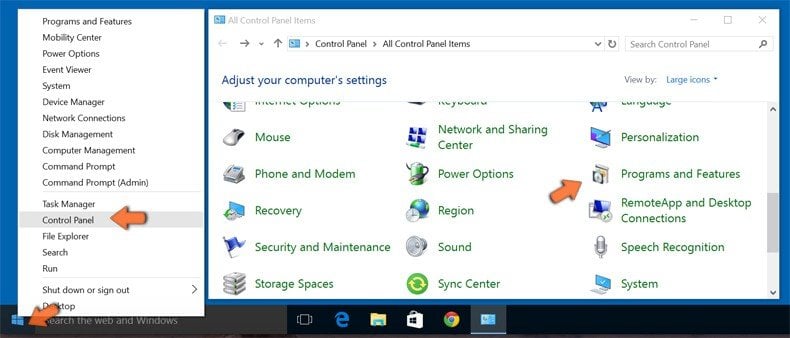
Right-click in the lower left corner of the screen, in the Quick Access Menu select Control Panel. In the opened window choose Programs and Features.
Windows 7 users:
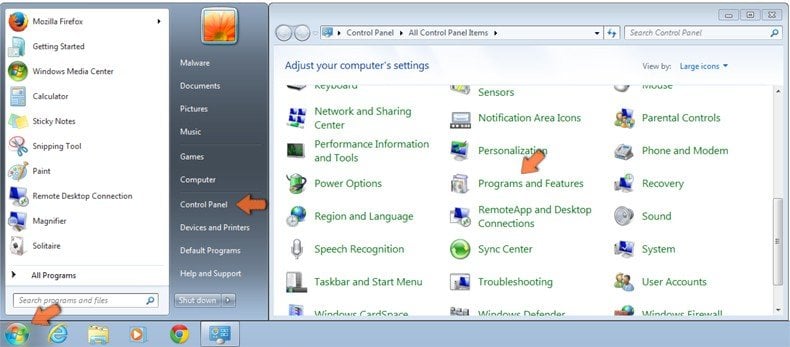
Click Start (Windows Logo at the bottom left corner of your desktop), choose Control Panel. Locate Programs and click Uninstall a program.
macOS (OSX) users:
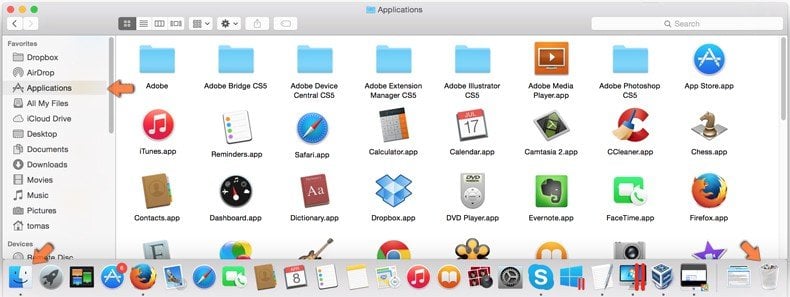
Click Finder, in the opened screen select Applications. Drag the app from the Applications folder to the Trash (located in your Dock), then right click the Trash icon and select Empty Trash.
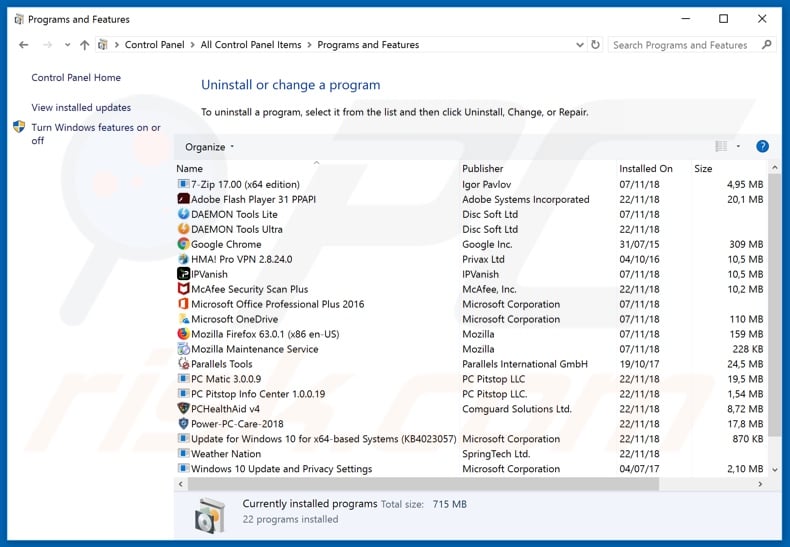
In the uninstall programs window, look for "Image Search", select this entry and click "Uninstall" or "Remove".
After uninstalling the potentially unwanted application (which causes Image Search ads), scan your computer for any remaining unwanted components or possible malware infections. To scan your computer, use recommended malware removal software.
DOWNLOAD remover for malware infections
Combo Cleaner checks if your computer is infected with malware. To use full-featured product, you have to purchase a license for Combo Cleaner. 7 days free trial available. Combo Cleaner is owned and operated by RCS LT, the parent company of PCRisk.com.
Remove Image Search adware from Internet browsers:
Video showing how to remove potentially unwanted browser add-ons:
 Remove malicious extensions from Google Chrome:
Remove malicious extensions from Google Chrome:
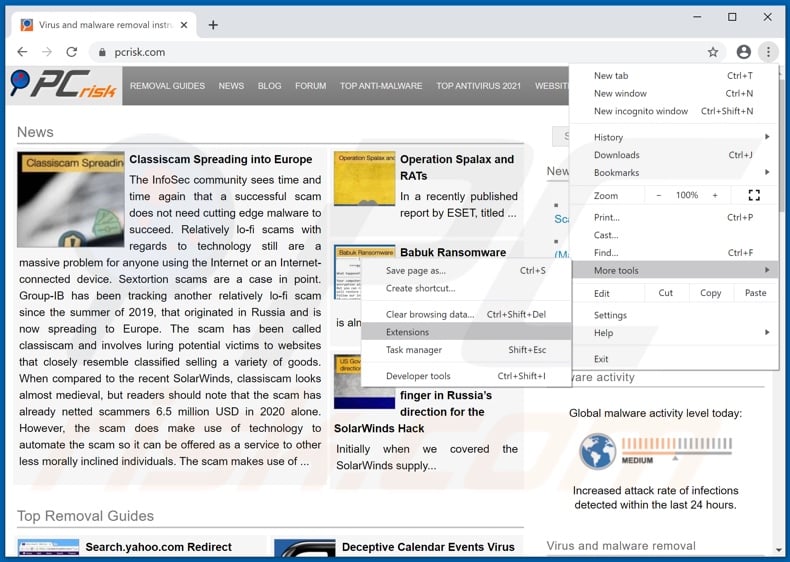
Click the Chrome menu icon ![]() (at the top right corner of Google Chrome), select "More tools" and click "Extensions". Locate "Image Search", select this entry and click the trash can icon.
(at the top right corner of Google Chrome), select "More tools" and click "Extensions". Locate "Image Search", select this entry and click the trash can icon.
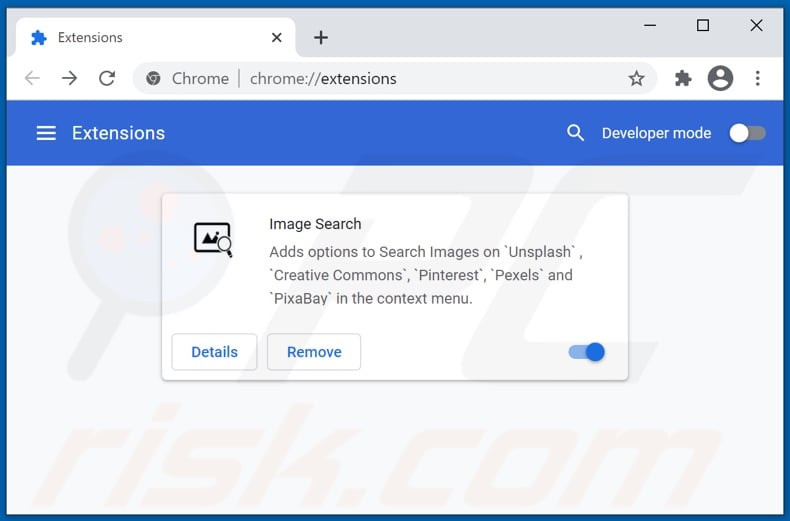
Optional method:
If you continue to have problems with removal of the ads by image search, reset your Google Chrome browser settings. Click the Chrome menu icon ![]() (at the top right corner of Google Chrome) and select Settings. Scroll down to the bottom of the screen. Click the Advanced… link.
(at the top right corner of Google Chrome) and select Settings. Scroll down to the bottom of the screen. Click the Advanced… link.
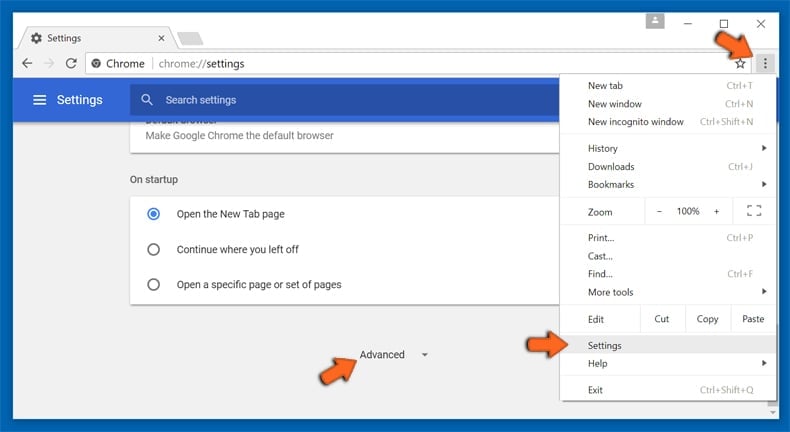
After scrolling to the bottom of the screen, click the Reset (Restore settings to their original defaults) button.
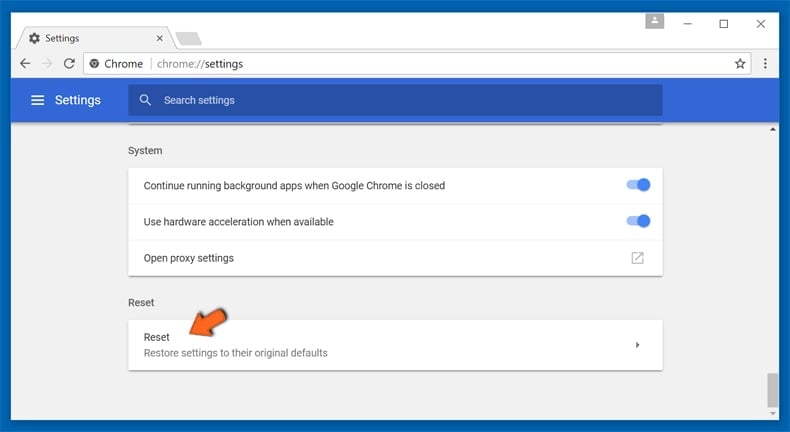
In the opened window, confirm that you wish to reset Google Chrome settings to default by clicking the Reset button.
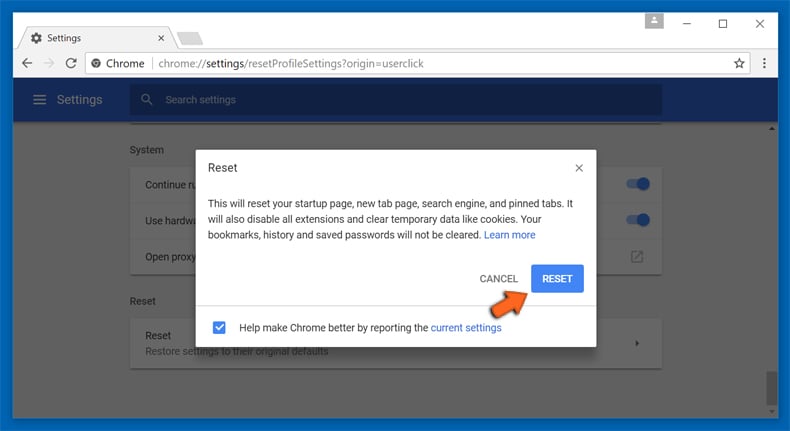
 Remove malicious plugins from Mozilla Firefox:
Remove malicious plugins from Mozilla Firefox:
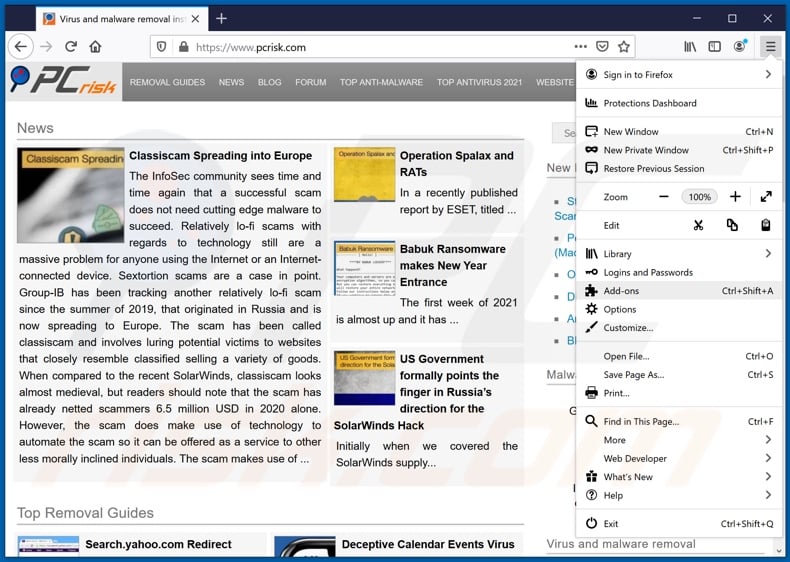
Click the Firefox menu ![]() (at the top right corner of the main window), select "Add-ons". Click "Extensions", in the opened window, remove "Image Search".
(at the top right corner of the main window), select "Add-ons". Click "Extensions", in the opened window, remove "Image Search".
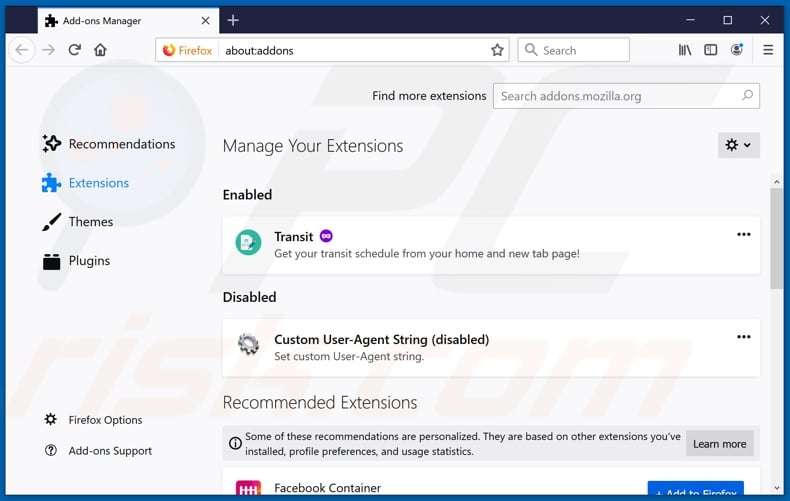
Optional method:
Computer users who have problems with ads by image search removal can reset their Mozilla Firefox settings.
Open Mozilla Firefox, at the top right corner of the main window, click the Firefox menu, ![]() in the opened menu, click Help.
in the opened menu, click Help.
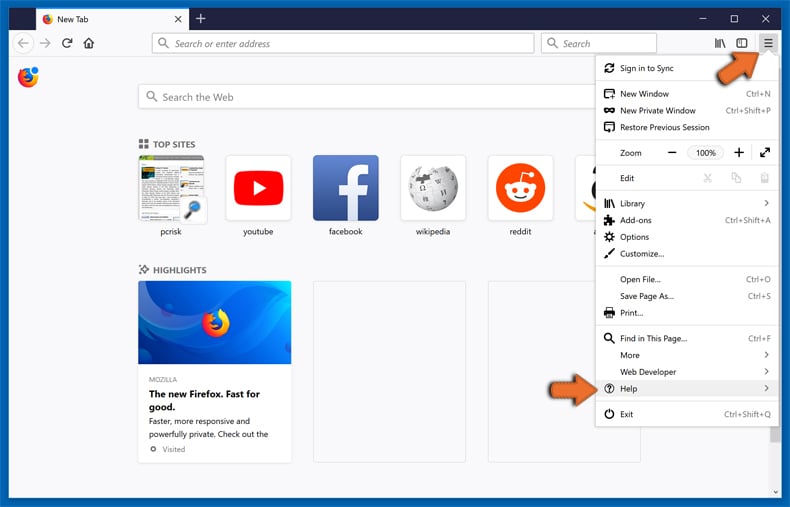
Select Troubleshooting Information.
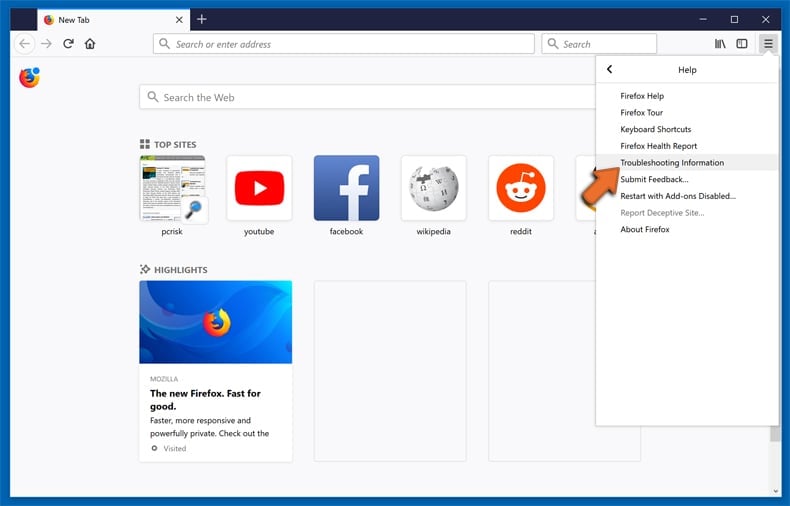
In the opened window, click the Refresh Firefox button.
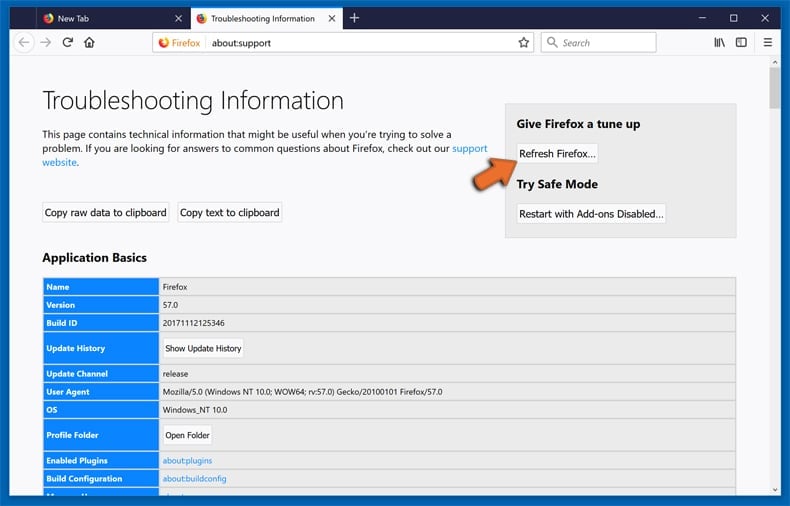
In the opened window, confirm that you wish to reset Mozilla Firefox settings to default by clicking the Refresh Firefox button.
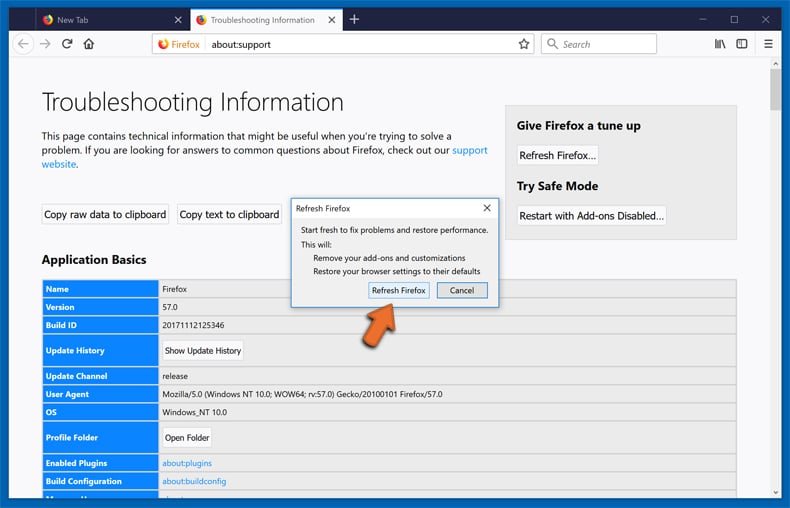
 Remove malicious extensions from Safari:
Remove malicious extensions from Safari:
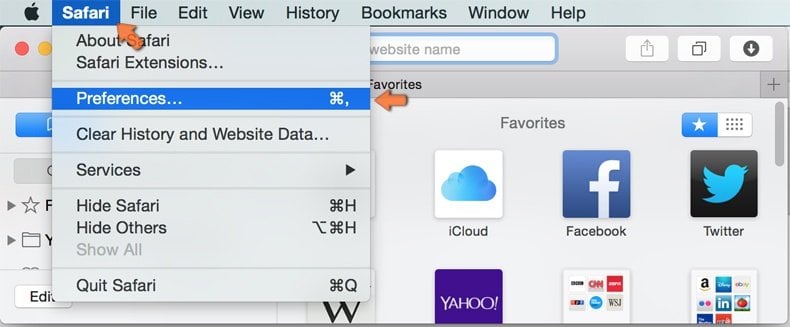
Make sure your Safari browser is active, click Safari menu, and select Preferences....
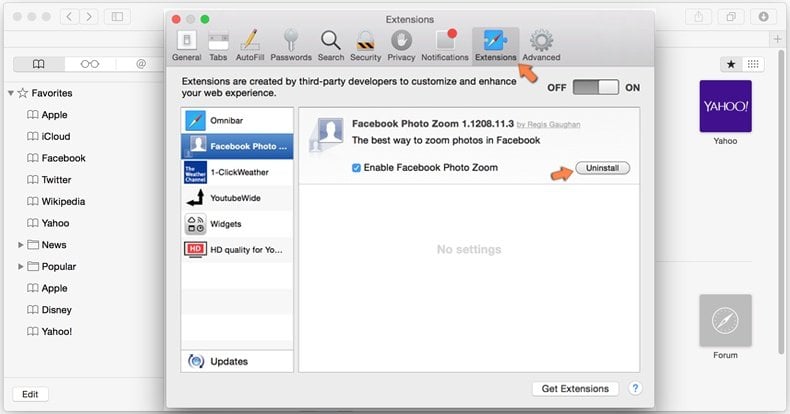
In the opened window click Extensions, locate any recently installed suspicious extension, select it and click Uninstall.
Optional method:
Make sure your Safari browser is active and click on Safari menu. From the drop down menu select Clear History and Website Data...
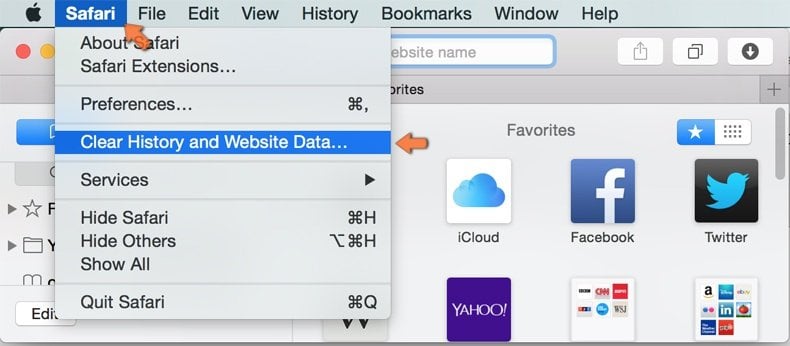
In the opened window select all history and click the Clear History button.
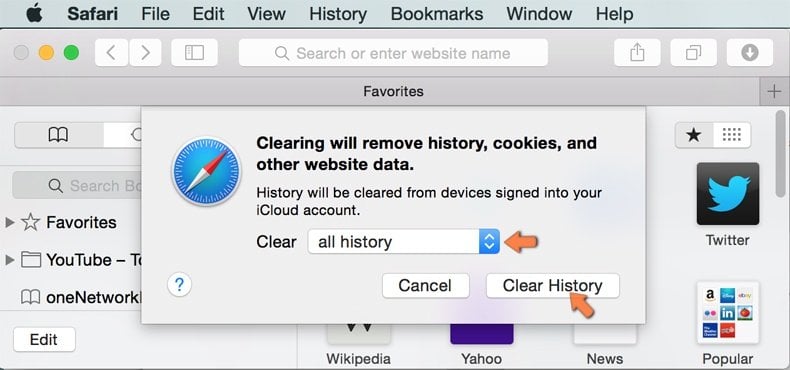
 Remove malicious extensions from Microsoft Edge:
Remove malicious extensions from Microsoft Edge:
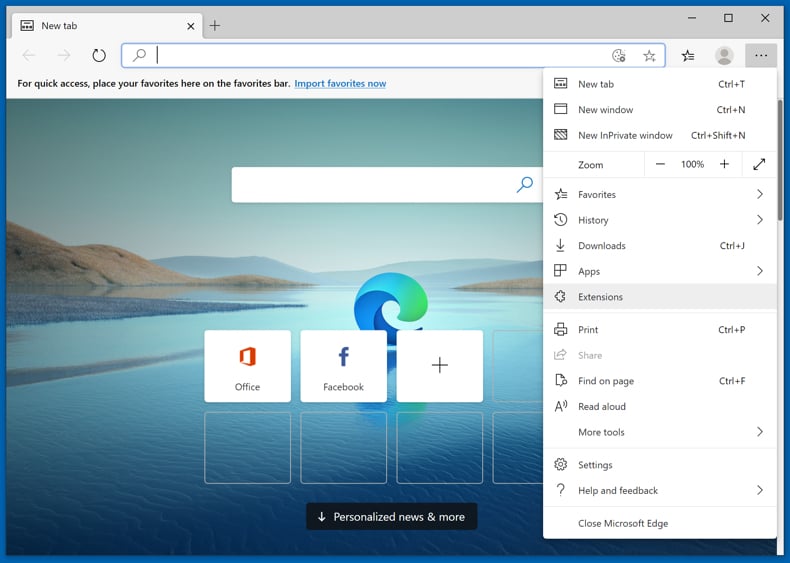
Click the Edge menu icon ![]() (at the upper-right corner of Microsoft Edge), select "Extensions". Locate all recently-installed suspicious browser add-ons and click "Remove" below their names.
(at the upper-right corner of Microsoft Edge), select "Extensions". Locate all recently-installed suspicious browser add-ons and click "Remove" below their names.
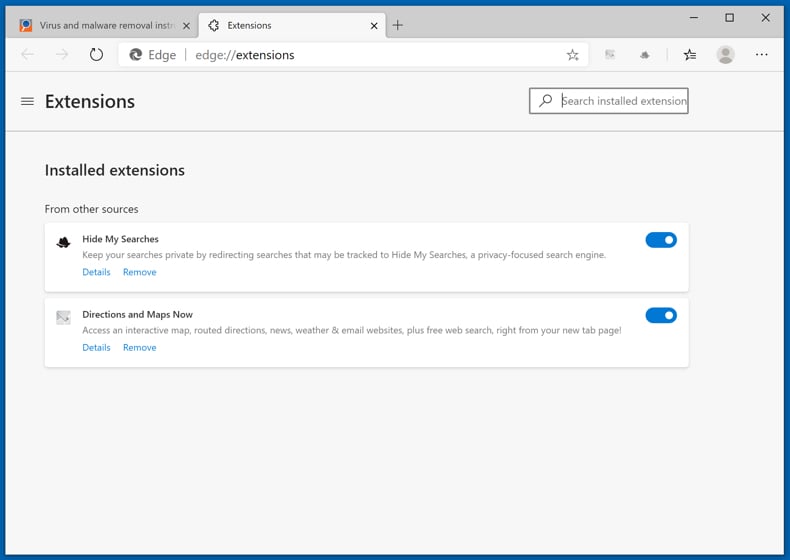
Optional method:
If you continue to have problems with removal of the ads by image search, reset your Microsoft Edge browser settings. Click the Edge menu icon ![]() (at the top right corner of Microsoft Edge) and select Settings.
(at the top right corner of Microsoft Edge) and select Settings.
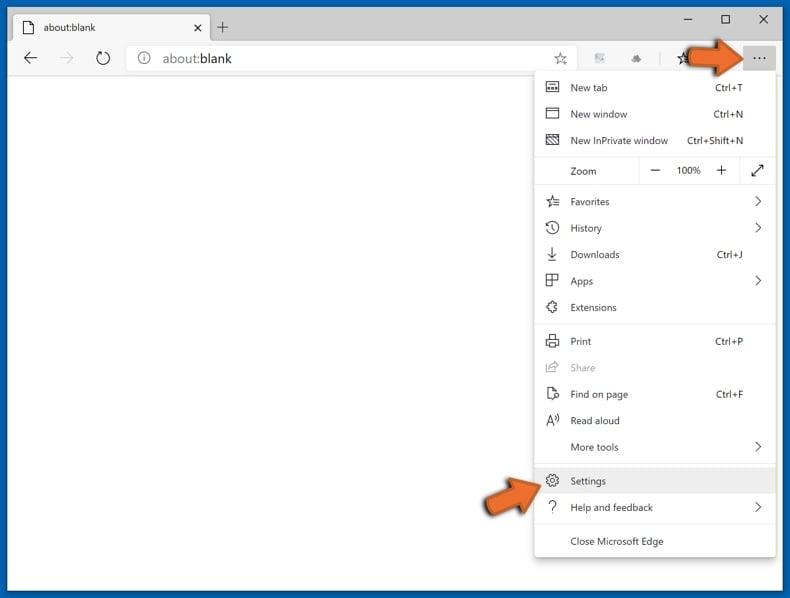
In the opened settings menu select Reset settings.
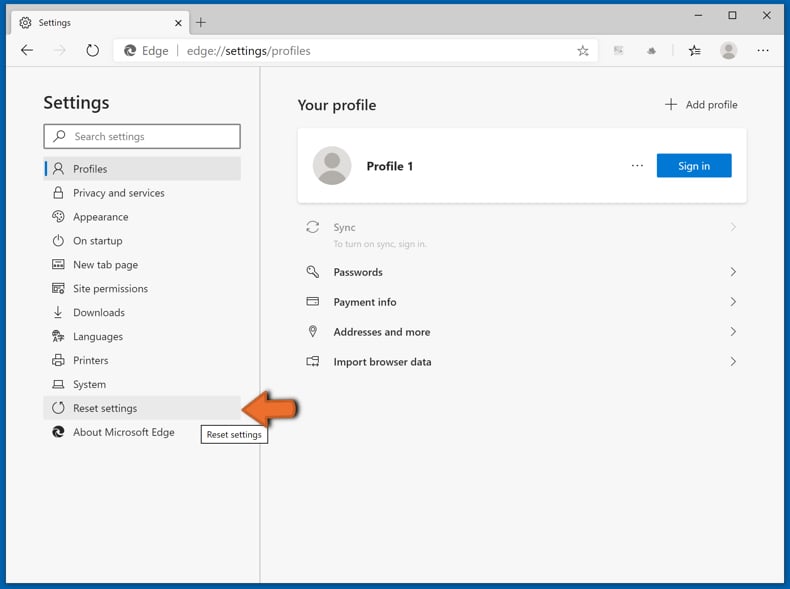
Select Restore settings to their default values. In the opened window, confirm that you wish to reset Microsoft Edge settings to default by clicking the Reset button.
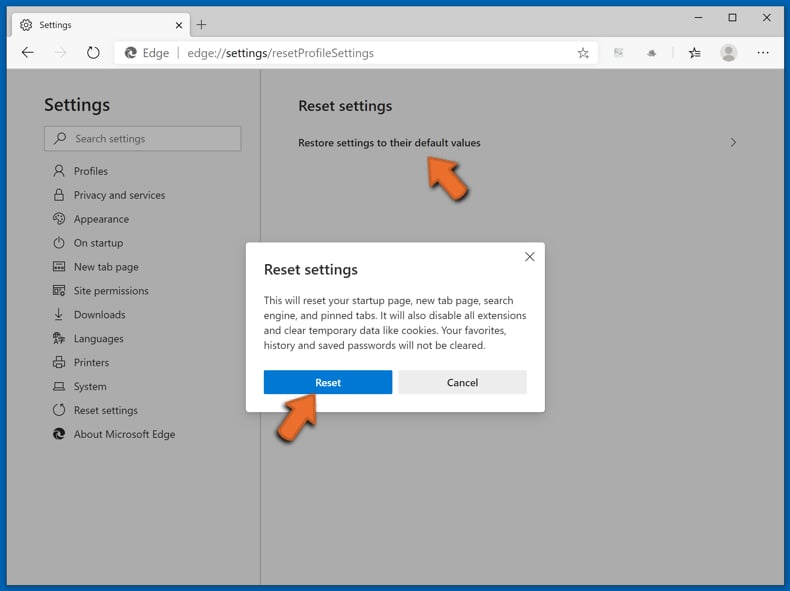
- If this did not help, follow these alternative instructions explaining how to reset the Microsoft Edge browser.
 Remove malicious add-ons from Internet Explorer:
Remove malicious add-ons from Internet Explorer:
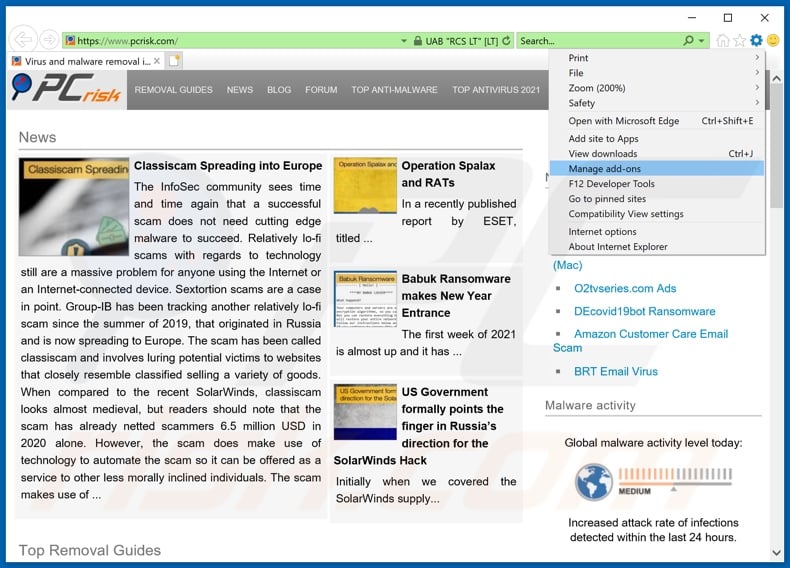
Click the "gear" icon ![]() (at the top right corner of Internet Explorer), select "Manage Add-ons". Look for "Image Search", select this entry and click "Remove".
(at the top right corner of Internet Explorer), select "Manage Add-ons". Look for "Image Search", select this entry and click "Remove".
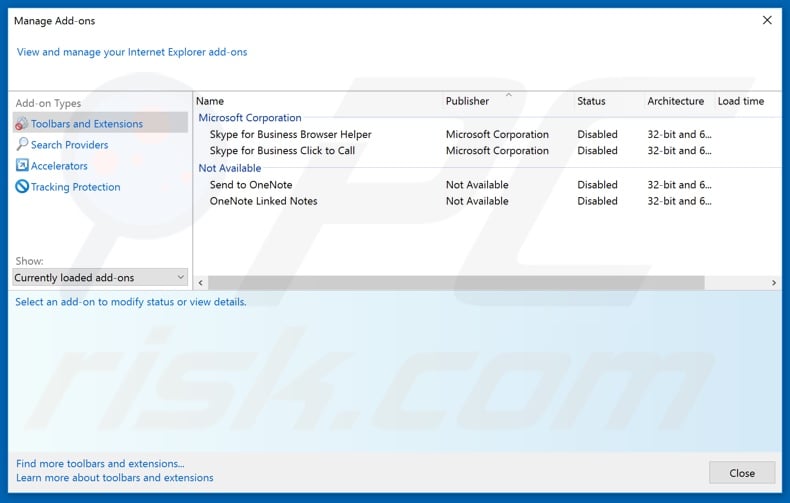
Optional method:
If you continue to have problems with removal of the ads by image search, reset your Internet Explorer settings to default.
Windows XP users: Click Start, click Run, in the opened window type inetcpl.cpl In the opened window click the Advanced tab, then click Reset.
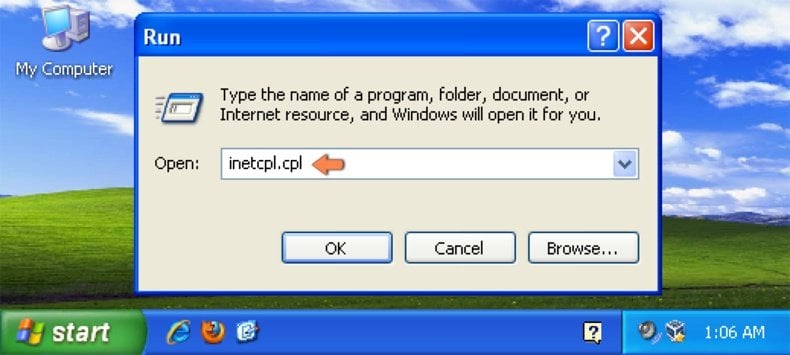
Windows Vista and Windows 7 users: Click the Windows logo, in the start search box type inetcpl.cpl and click enter. In the opened window click the Advanced tab, then click Reset.
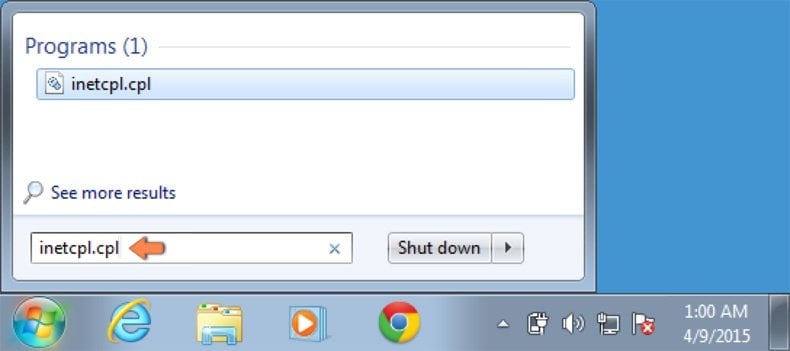
Windows 8 users: Open Internet Explorer and click the gear icon. Select Internet Options.
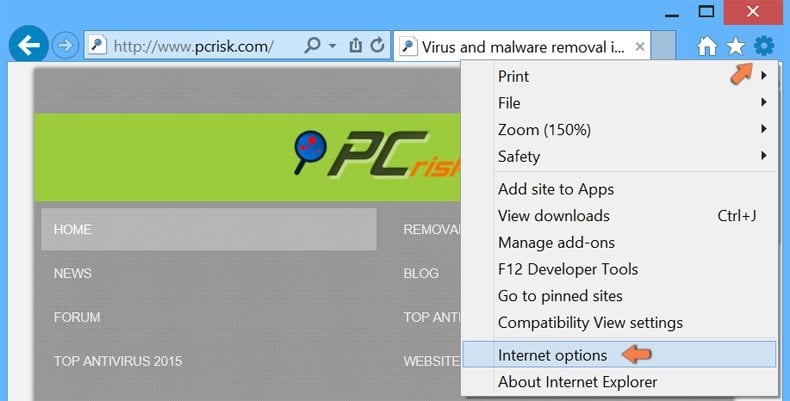
In the opened window, select the Advanced tab.
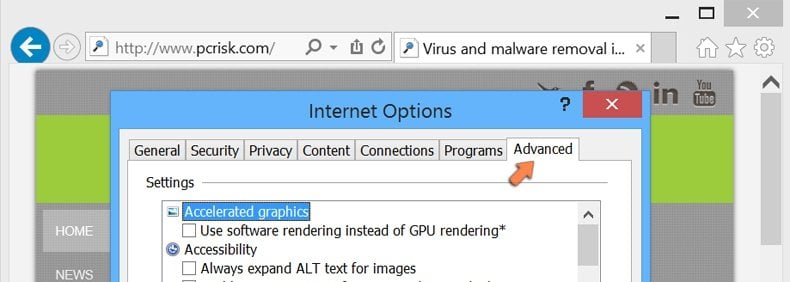
Click the Reset button.

Confirm that you wish to reset Internet Explorer settings to default by clicking the Reset button.
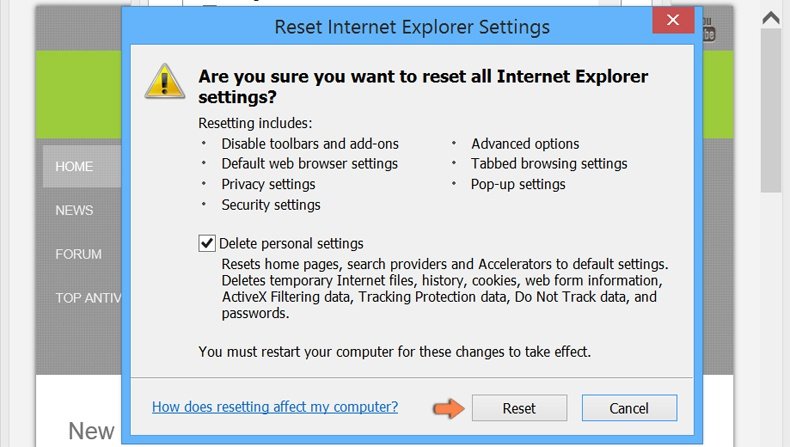
Summary:
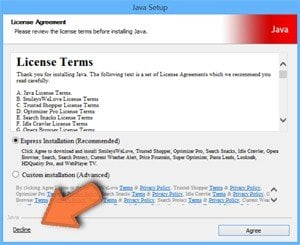 Commonly, adware or potentially unwanted applications infiltrate Internet browsers through free software downloads. Note that the safest source for downloading free software is via developers' websites only. To avoid installation of adware, be very attentive when downloading and installing free software. When installing previously-downloaded free programs, choose the custom or advanced installation options – this step will reveal any potentially unwanted applications listed for installation together with your chosen free program.
Commonly, adware or potentially unwanted applications infiltrate Internet browsers through free software downloads. Note that the safest source for downloading free software is via developers' websites only. To avoid installation of adware, be very attentive when downloading and installing free software. When installing previously-downloaded free programs, choose the custom or advanced installation options – this step will reveal any potentially unwanted applications listed for installation together with your chosen free program.
Post a comment:
If you have additional information on ads by image search or it's removal please share your knowledge in the comments section below.
Share:

Tomas Meskauskas
Expert security researcher, professional malware analyst
I am passionate about computer security and technology. I have an experience of over 10 years working in various companies related to computer technical issue solving and Internet security. I have been working as an author and editor for pcrisk.com since 2010. Follow me on Twitter and LinkedIn to stay informed about the latest online security threats.
PCrisk security portal is brought by a company RCS LT.
Joined forces of security researchers help educate computer users about the latest online security threats. More information about the company RCS LT.
Our malware removal guides are free. However, if you want to support us you can send us a donation.
DonatePCrisk security portal is brought by a company RCS LT.
Joined forces of security researchers help educate computer users about the latest online security threats. More information about the company RCS LT.
Our malware removal guides are free. However, if you want to support us you can send us a donation.
Donate
▼ Show Discussion